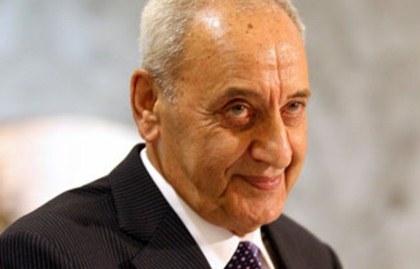Berri Exerting Efforts with All Sides to Reach Agreement on Electoral Law
إقرأ هذا الخبر بالعربية
Speaker Nabih Berri is seeking to ease the differences between the various Lebanese powers over the new parliamentary electoral law, reported An Nahar daily on Monday.
Information obtained by the daily revealed that the speaker, through Hizbullah's backing, had held separate talks with Mustaqbal bloc head MP Fouad Saniora, National Struggle Front ministers, and Phalange Party MP Sami Gemayel to that end.
He is set to hold talks with Lebanese Democratic Party head MP Talal Arslan and Lebanese Forces MP Antoine Zahra in separate meetings later this week.
He is also set to meet with representatives from the Free Patriotic Movement.
The speaker is seeking to reach an agreement on a new electoral law that appeases all sides and does not eliminate any of them, reported An Nahar.
It noted that through his efforts, Berri had eliminate the need to form a subcommittee to tackle the electoral law.
The subcommittee was set to be formed on Thursday during a meeting for the joint parliamentary committees.
Mustaqbal sources meanwhile told the daily that the movement would agree to any electoral law that caters to the concerns of all sides.
Meanwhile, Loyalty to the Resistance bloc Minister Hussein al-Hajj Hassan stated on Sunday that the 1960 electoral law and one based on 50 electoral districts do not grant fair representation.
“The adoption of Lebanon as one district based on proportionality will offer the best representation,” he noted.
“We advocated the adoption of 13 districts based on proportionality because of the inability to adopt one district at the moment,” he explained.
Also on Sunday, Loyalty to the Resistance bloc Minister Mohammed Fneish declared that proportionality ensures fair representation and guarantees diversity in Lebanon.
“We are hoping that for once, an electoral law that rectifies the flaws in our political system would be adopted,” he stressed.
In August, the government approved an electoral draft law based on proportional representation and 13 districts.
The law was rejected by the opposition and Progressive Socialist Party leader MP Walid Jumblat.
Lebanese Forces leader Samir Geagea had recently voiced his support for the adoption of an electoral law based on 50 districts, saying it provides the fairest representation.
Opposition MPs Adwan, Gemayel and Butros Harb proposed an electoral law based on 50 small-sized districts in a winner-takes-all system, while a plan suggested by MP Michel Aoun’s Change and Reform bloc would allow every sect to elect its own MPs under a proportional representation system with Lebanon as a single district.
Hezb allah, Lebanese forces, Mustakbal, amal, aoun, kataeb... Christians, Muslims , drouz.... same people electing the same people over and over again even thought the politians are failing in doing anything good. Can the Lebanese people please stop voting according to a political party or religion and start voting for a NEW, EDUCATED young people that can really work on improving the country and stop the discrimination! i guess not :)
One side wants 50 small districts while the other like 13 districts.
How about meeting half way at 31 or 32 districts?
a good representative of the people is not afraid of any kind of electoral law
the ones who are searching to manipulate the election laws for their benefit are not polititians they are at the best mafiosies at the best and puppets (agents ) at the wworse
god bless 10452
So the way the present electoral law works is that a given seat is designated for, say, a "Christian", and whoever wins that seat is supposed to serve "Christian" interests, but the problem is that not enough "Christians" live in this district so that it ends up being "non-Christians" competing for the honor of winning this seat? So one thing that has to change, along with voters' courage in resisting war-lords (as they seem to me), is journalism describing what is happening. That'd be like expecting the US journalists to describe what Israel is doing and what US politicians do for Israel. But the Lebanese case seems more a purely legal problem. Seats should not be assigned by creed-ethnicity. That's like Jim Crow in the old US South. It's a bad law.



